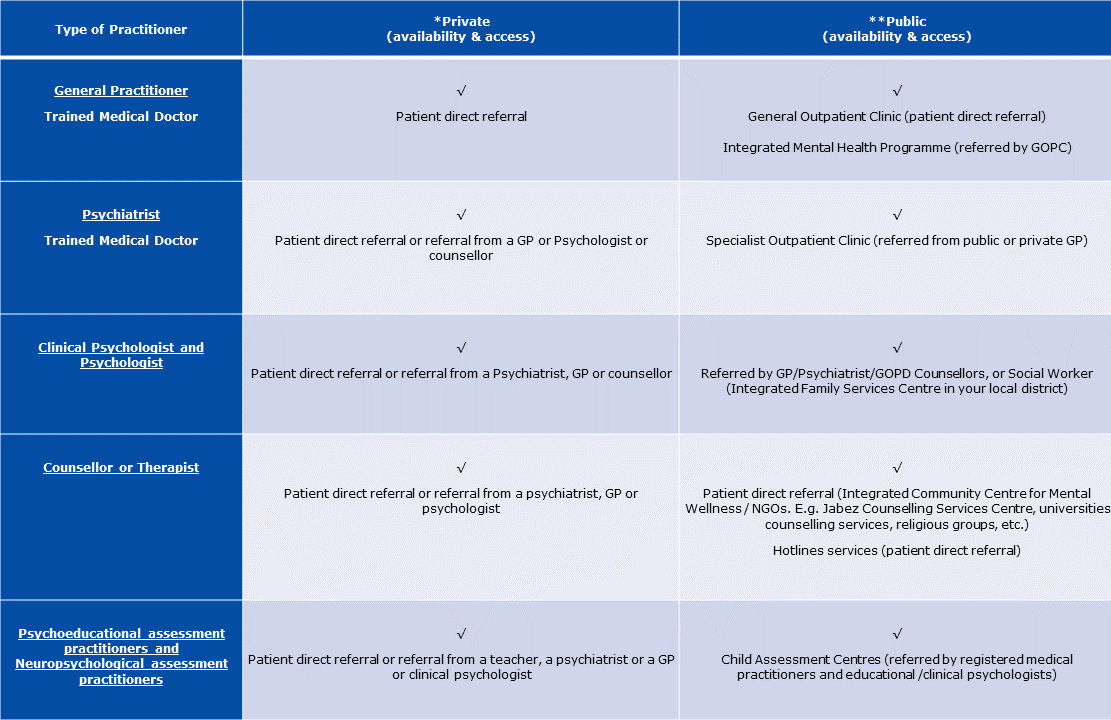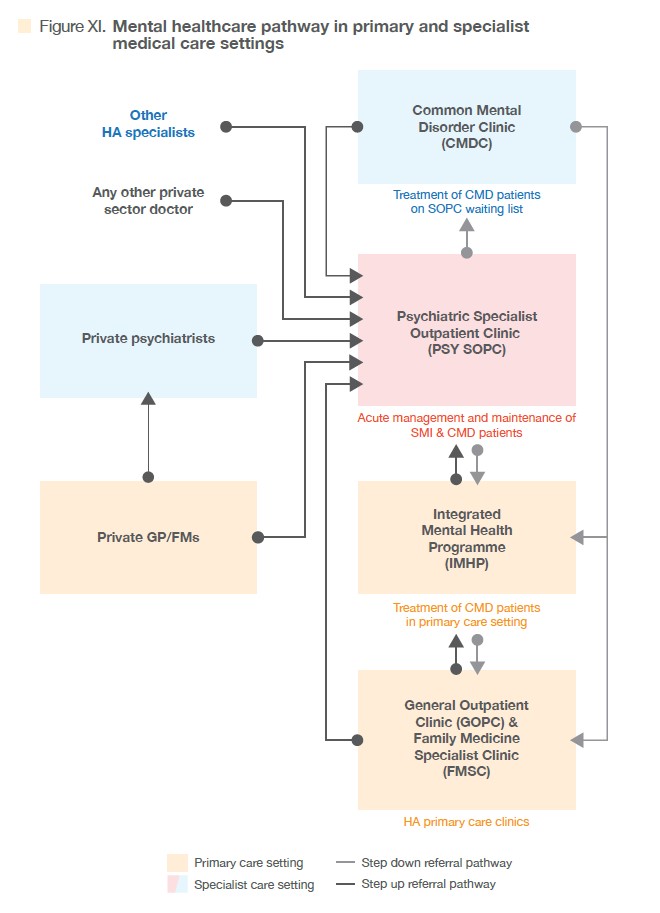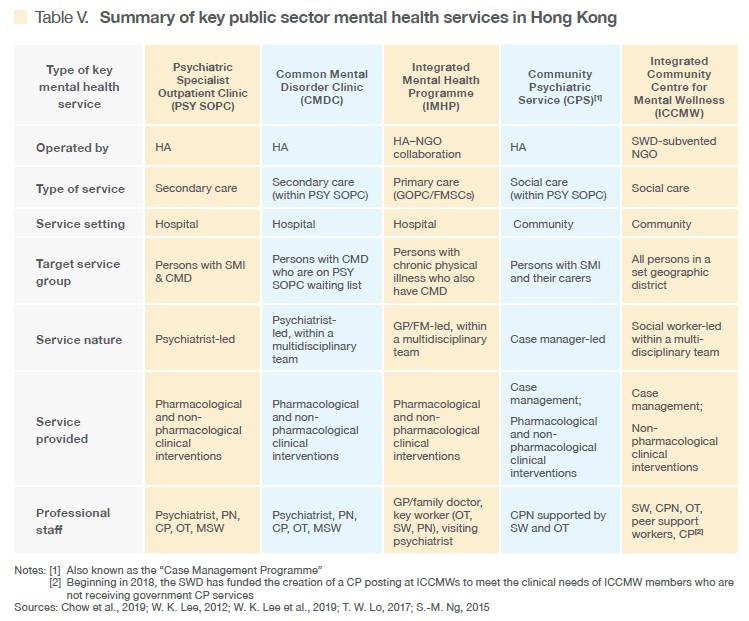Overview of Public and Private Mental Health Resources in Hong Kong
We all have mental health, just like we all have physical health. Our mental health exists on a continuum, and depending on what is happening in our lives, we will shift back and forth on that continuum throughout our lives. Depending on where we are on that continuum, different levels of support are needed.
When we think about mental health, a flood of questions often arise – from the simple to the complex:
- What are mental health services?
- What is the difference between a psychiatrist and a psychologist?
- What about therapists and counsellors?
- How do I access such services here in Hong Kong?
- And many more…
At the time of writing (2023 Q3), the average waiting time for a child to access a standard appointment with a psychiatrist through the public sector was two years (urgent cases are, of course, seen more rapidly). In context, this means that a child, say aged 6 years old, will have spent a quarter of his or her life with a potential mental health condition without any diagnosis or treatment by the time they are seen. For a territory of our affluence, this is unacceptable.
Child Resources
Given that the mental health challenges for children and adolescents in Hong Kong have long demanded increased attention and have been further negatively impacted since the COVID-19 pandemic, the Chamber has first sought to publish a resource to guide readers through the resources available for children, although some of this is applicable to adolescents and adults as well.
Every child is different. A mental health professional can help parents or caregivers understand what behaviours are healthy and how to cope when concerns arise. For many parents, children and adolescents’ mental health support can be reassuring and empowering. Where to start?
Finding the right mental health professional for your child
Psychotherapy, medication, and a combination of both have been shown to help children and adults who are struggling with their mental health. There are several effective treatments available for emotional and behavioural problems. The first step is making sure you find the right person to help with your difficulties. Knowing the difference between a therapist, psychologist, psychiatrist, and counsellor will give you insight into what to expect from these professionals.
The following is a list of the Types of Practitioners available in Hong Kong who can help individuals who are struggling with their mental health. The table is followed by definitions of what these practitioners are and what they do.

General Practitioners (GPs) are medical doctors trained to identify and manage common mental health problems, including depression and anxiety. GPs can assess your condition and, if suitable, prescribe medications for mild to moderate mental health conditions. If necessary, they will refer you to a mental health specialist, such as a psychiatrist or psychologist.
Psychiatrists are medical doctors who specialize in treating a wide range of mental health conditions, including but not limited to depression, anxiety, bipolar disorder, and schizophrenia. They are trained to address various mental health conditions. Psychiatrists have the authority to prescribe specialist medications and conduct general & mental health assessments. Typically, their approach consists of a combination of psychotherapy and medical treatments, and they collaborate closely with clinical psychologists.
Psychologists and clinical psychologists Unlike psychiatrists, psychologists and clinical psychologists do not prescribe any medication. However, they use specific therapeutic techniques to help clients with their presenting problems. You may be surprised to know that in Hong Kong, anyone can call themselves a psychologist. Currently in Hong Kong, there is no regulation of this title. It is important for patients to do their research and find a psychologist counsellor or clinical psychologist that:
(a) Has adequate training, and
(b) Is part of a professional registration board in Hong Kong or overseas.
Some examples of professional registration boards are listed below:
- The Hong Kong Institute of Clinical Psychologists (HKICP)
- The Hong Kong Professional Counselling Association (HKPCA)
- The Hong Kong Association of Doctors in Clinical Psychology (HKADCP)
- The Hong Kong Psychological Society (HKPS)
- The Hong Kong Psychological Society Division of Clinical Psychology (HKPS-DCP)
- The Health and Care Professions Council, UK (HCPC)
We recommend that, for any professional you choose to work with, you check their qualifications and experience before making an appointment. Patients are encouraged to ask professionals about their qualifications and registrations prior to booking an initial appointment.
The difference between a counsellor, psychologist, and clinical psychologist
Counsellors or psychologists help patients or clients address emotional, social, and physical stressors in their lives. Counsellors or psychologists are more likely to work with individuals who have fewer complex psychological problems and may be struggling with challenging life issues, such as bereavement or relationship difficulties.
Clinical psychologists can work with the same presenting problems as counsellors and psychologists however they can have also been extensively trained to work with clinical presentations of mental health, such as depression, anxiety, bipolar disorder, psychosis etc. Clinical psychologists have undergone further training than counsellors and psychologists and hold either a masters or doctoral degree in clinical psychology.
There is considerable overlap between counselling and clinical psychology. Traditionally however, the main difference between counselling and clinical psychology is their perspective and training. Counsellors and psychologists, in general, focus on working with individuals who have less severe conditions, whereas clinical psychology focuses on individuals with more serious mental health issues.
What does a therapist do?
In therapy, you’ll work with a trained mental health professional. What you’ll do in each appointment depends on the preferred methods of your therapist and the issues you’re looking to address.
You can expect to spend some time discussing how challenging situations, emotions, and behaviours affect your life. Below is a list of some of the common types of therapy offered:
- Play Therapy is a method of therapy that uses play to uncover and deal with psychological issues. It can be used on its own, particularly with children, or along with other therapies and medications.
- Dialectical Behavioural Therapy (DBT) helps people learn strategies to manage their emotions better. It focuses on identifying triggers and finding different ways to respond in the moment. DBT is a common therapy for teens.
- Behavioural Therapy helps parents manage children’s actions by reinforcing positive behaviours and reducing negative ones. It can involve the use of checklists and rewards.
- Occupational Therapy (OT) helps children practice specific skills, such as getting dressed, writing and playing. It is also beneficial for children with sensory sensitivities such as to textures or loud noises.
- Cognitive Behavioural Therapy (CBT) helps to identify negative and unhealthy thought patterns, behaviours, and beliefs, and replace them with healthy and positive ones.
- Psychodynamic Therapy helps to identify the root cause of your presenting issue rather than only focusing on the symptom and unhelpful behaviours and beliefs.
- Acceptance & Commitment Therapy (ACT) helps to make individuals become aware of and accept their thoughts and feelings. They can then commit to making changes which increases their ability to cope with and adjust to situations.
- Compassion-Focused Therapy (CFT) promotes emotional healing by encouraging compassion towards others and oneself.
- Eye Movement Desensitisation & Reprocessing (EMDR) is a type of psychotherapy focusing on helping people heal from the symptoms and effects of traumatic life experiences.
- Humanistic Therapy explores how your worldview affects the choices you make, especially choices that cause distress. It’s based on the belief that you’re the best person to understand your experiences and needs.
- Schema Therapy is an integrative therapy combining theory and techniques from previously existing therapies. It helps individuals undercover, understand and change unhelpful patterns that are getting in the way of living a fulfilled life.
Where to start?
Reaching out for support and help can be difficult when you or your child are struggling, but the feeling of helplessness will only increase as you continue coping with an issue without support.
Who to reach out to will be guided by the urgency of the situation and the financial resources and medical insurance coverage available.
Urgent / Emergency Situations
- DO NOT DELAY SEEKING SUPPORT
- In case of an emergency, or if you are seriously worried about the safety of yourself or someone else, please call 999 or visit your nearest emergency room immediately.
Less Urgent Situations
When seeking help, you can start by reaching out to someone you trust. This could be your GP, a teacher, school counsellor, colleague, or family member.
Government Mental health support hotline in Hong Kong:
One-stop, all year round and round-the-clock support for people with mental health needs. Calls will be answered by dedicated personnel providing immediate support and counselling services to members of the public. Callers from all backgrounds and of all ages will also be referred to appropriate organisations depending on the nature of individual cases. The hotline co-ordinates about 20 related organisations to provide comprehensive mental support services.
Contact Tel Number: 18111
NGO Mental health support hotlines in Hong Kong include:
Baptist Oi Kwan Social Service: is a charitable organisation offering a number of programmes for children, youth and family services and pre-primary school, they have a family resource and service centre providing support and counselling for families recovering from mental illness.
Contact Tel Number: 2535-4135
Joyful Mental Health Foundation: is a non-profit making charitable organisation that aims to promote greater knowledge of mood disorders reducing misunderstanding and discrimination. They provide counselling services and assistance to patients and their families. They have programs for children and youth. Suitable for all ages, fees depend on income, there is a small administration fee for each counselling session.
Contact Tel Number: Emotional Support Hotline: 2301-2303
Samaritans Hong Kong: A charitable organisation where all services are free. Staff and volunteers offer emotional (Multilingual) support by phone and by email. They provide mental wellbeing education to primary and secondary schools (Cantonese only).
Contact Tel Number: 24 hours multilingual hotline: 2896-0000 or via email on jo@samaritans.org.hk
Samaritan Befrienders: A charitable organisation all services are free. Staff and volunteers offer emotional support hotlines for those with suicidal thoughts and for family and friends.
Contact Tel Number – 24 hours Chinese hotline 2389-2222, English hotline 2389-2223
St Johns Cathedral Counselling Service: one of the most established mental health NGOs in Hong Kong providing multi-cultural counselling. Services include counselling for students (primary and secondary grade students), as well as their parents and families, both on school campuses and at their office at Central, Hong Kong. All counselling sessions require the client to pay for the counselling sessions, fees are based on a “multiple factors sliding scale” and consider monthly household income.
Contact Tel Number – 2525-7207/8
ReSource The Counselling Centre: is a charitable organisation that offers multilingual support for a number of mental health problems. All counselling sessions require the client to pay for the counselling sessions, fees are based on a “multiple factors sliding scale” and consider monthly household income.
Contact Tel Number: 2523-8979
The Zubin Foundation Children’s Counselling Centre: The Zubin Foundation’s Children’s Counselling Centre serves children aged 5-16 in the ethnic minority community providing them support through free counselling in English and Hindi/Urdu.
Contact Tel Number: 9682-3100
Private Sector Resources
If financial resources and/or insurance coverage are available, then access to care may be faster in the private sector.
We have compiled a list of Private Practice Mental Health Professionals from the various mental health disciplines listed above: In this resource, you will find a list of Professionals who offer Mental Health Support to Children.
What can Companies do?
A 2020 report published by City Mental Health Alliance, Hong Kong (CMHAHK) found that only 36% of employees in APAC felt that the mental health resources offered by their employers were sufficient. In this post-Covid era, employee mental health and wellbeing needs to continue to be a top workplace priority for employers.
Workplace mental health initiatives should not only focus on the mental health and wellbeing of individual employees, but should also aim to provide education on how employees can support the mental health of their families.
Many organisations offer Employee Assistance Programs (EAP’s). An EAP is a benefit program that assists employees with personal or work-related problems that may impact their job performance, physical and mental health and general well-being. Through an EAP employees typically have access to a trained professional to assist with confidential assessments, short-term counselling, referrals and follow-up services with all costs covered by an employer. Companies should consider extending these services to also cover employee spouses and dependants.
Supporting mental health in the workplace is no longer a nice-to-have but a necessity. Creating wellbeing solutions to help employees thrive is the first step. Please see below for a list of organisations that can assist with employee mental health initiatives:
City Mental Health Alliance, Hong Kong (CMHA HK)
Public Sector Resources
Patients can book an appointment by phone or online (via the HA Go app) to one of General Outpatient Clinics to see a GP for treatment and referral. For those with more serious psychological distress, the Clinical Psychological Service of the Social Welfare Department can provide free professional help and advice. Contact a social worker or call the Social Welfare Department hotline at 2343-2255 for assistance. For more information from The Hong Kong Government on Mental Health Support please refer to the following websites:
GovHK - Health & Medical Services
HKFP’s comprehensive guide to mental health services in Hong Kong
The additional information below relating to public health services was provided with thanks by “Our Hong Kong Foundation”
- Psychiatric Specialist Outpatient Clinic (PSY SOPC): Psychiatrist-led services for patients with severe mental illnesses and common mental disorders.
- Common Mental Disorder Clinic (CMDC): Psychiatrist-led services for persons with common mental disorders on PSY SOPC waitlist.
- Integrated Mental Health Programme (IMHP): Collaboration between HA and NGO to provide services led by general practitioners or family doctors for persons with chronic physical illness and common mental disorders.
- Common Psychiatric Services (CPS): Case management in community for patients with severe mental illnesses and their carers.
- Integrated Community Centre for Mental Wellness (ICCMW): Social worker-led services operated by NGO and subvented by the Social Welfare Department (SWD) in community for all citizens in the district.
You can find more details in the table and graph below, captured from Our Hong Kong Foundation’s report 2022 titled "Towards a Fit-for-Purpose Mental Health System".


Abbreviations used:
| HA | Hospital Authority |
| MSW | Medical Social Worker |
| SW | Social Worker |
| PN | Psychiatric Nurse |
| CPN | Community Psychiatric Nurse |
Disclaimer: The information provided by the British Chamber of Commerce Hong Kong’s Healthcare Sub-Committee (the “Committee”) in this directory is for general information purposes only. It is not intended to be a substitute for professional advice, diagnosis, or treatment. Users of this directory should rely on their own judgment when selecting healthcare providers or services and should seek the advice of qualified professionals for any specific concerns. The Committee endeavours to ensure the accuracy of such information. However, the accuracy or completeness of the information in this directory is not guaranteed. The Committee will not be liable for any errors in, omissions from, or misstatements or misrepresentations, express or implied, concerning any information provided by the Committee in this directory. The Committee will not be responsible for any damages or injuries resulting from your use of the information on our website or from your interactions with healthcare providers listed on our website. The Committee is not a medical provider and do not provide any medical services. You may find mental healthcare providers who offer healthcare and/or medical services that match the services you are looking for from this directory provided by the Committee. Any medical and/or healthcare services that you receive are provided by the medical/healthcare providers listed in the directory and not by the directory. The Committee expressly states that it has not approved or endorsed the information provided by other parties in this directory. The Committee’s provision of, or assistance in providing, any such information shall not constitute any form of co-operation or affiliation with the Committee of any such other parties. The Committee reserves the right to omit, suspend or edit all information in this directory at any time in its sole discretion without giving any reason or prior notice. You are responsible for making your own assessment of all information in this directory and are advised to verify such information. By accessing this website or this directory, you unconditionally agree to the terms of this Disclaimer and as they may be modified and/or supplemented from time to time by the Committee without prior notice to you. Please check this webpage regularly for any modifications and/or supplements which may be made.
